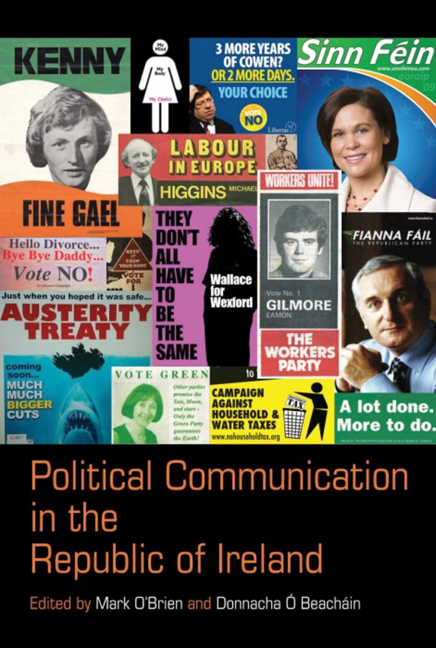Book contents
- Frontmatter
- Contents
- List of Illustrations
- Glossary
- Notes on Contributors
- Acknowledgements
- Introduction
- Part One Political Communication and Politicians
- Part Two Political Communication and Journalism
- 5 ‘Sources say …’: political journalism since 1921
- 6 In sickness and in health: politics, spin, and the media
- 7 Media advisers and programme managers
- 8 A limited focus? Journalism, politics, and the Celtic Tiger
- Part Three Political Communication and the Public
- Conclusion
- Index
8 - A limited focus? Journalism, politics, and the Celtic Tiger
from Part Two - Political Communication and Journalism
- Frontmatter
- Contents
- List of Illustrations
- Glossary
- Notes on Contributors
- Acknowledgements
- Introduction
- Part One Political Communication and Politicians
- Part Two Political Communication and Journalism
- 5 ‘Sources say …’: political journalism since 1921
- 6 In sickness and in health: politics, spin, and the media
- 7 Media advisers and programme managers
- 8 A limited focus? Journalism, politics, and the Celtic Tiger
- Part Three Political Communication and the Public
- Conclusion
- Index
Summary
Journalists dominated the 2009 end-of-year bestseller lists with books castigating Ireland's financial and political elites for causing the financial crisis that would eventually claim the country's economic sovereignty. In The Bankers Shane Ross criticised bank executives and regulators for their close relationship that facilitated years of reckless property speculation, while in Who Really Runs Ireland? Matt Cooper laid out the elite nexus of bankers, developers, politicians, and media owners that he argued allowed a thriving economy to overheat. In Ship of Fools, Fintan O'Toole traced the entwined Irish histories of economic mismanagement, political corruption, and financial fraud that combined so disastrously in the crisis. In Follow the Money, David McWilliams described a panicked Irish government amid the 2008 global financial meltdown, as then finance minister Brian Lenihan, eating garlic to stay awake, paid a late-night visit to the columnist's house for advice. In Anglo Republic, Simon Carswell forensically examined the succession of high-risk financial decisions by Anglo Irish Bank executives that forced the government to guarantee bank debts and deposits. These books unflinchingly laid out the national systemic political and financial failure that found apt symbolism, among international media, in the half-finished ‘ghost estates’ that littered the Irish countryside.
These post-crash books were cutting and critical. But such comprehensive analyses, commentators noted, were mostly absent during the boom years, from the mid-1990s to the mid-2000s, when Ireland's economy expanded with unprecedented growth. Conor Brady, a former editor of the Irish Times, wrote that the country's journalists had failed in their fundamental duty to act as watchdogs over political and financial elites. ‘Was the forming of this crisis reportable earlier? Were emerging trends apparent? Did they [the news media] do as good a job as they might have in flagging the approaching storm?’ asked Brady (2010). He concluded that the criticisms of systemic problems in the Irish financial system were not reported ‘in a form that was sufficiently sustained, coherent and authoritative’. In a similar vein, an examination of the coverage of the crisis in the Irish and British press found that reporters deserved an ‘F for probing and predicting’ (Marron, 2010, 274). Such critical sentiment was summarised in the conclusion to a study on the pre-crash performance of UK financial reporters: ‘The financial media […] did not warn us’ of the impending economic turmoil (Manning, 2013, 187).
- Type
- Chapter
- Information
- Political Communication in the Republic of Ireland , pp. 129 - 146Publisher: Liverpool University PressPrint publication year: 2014



